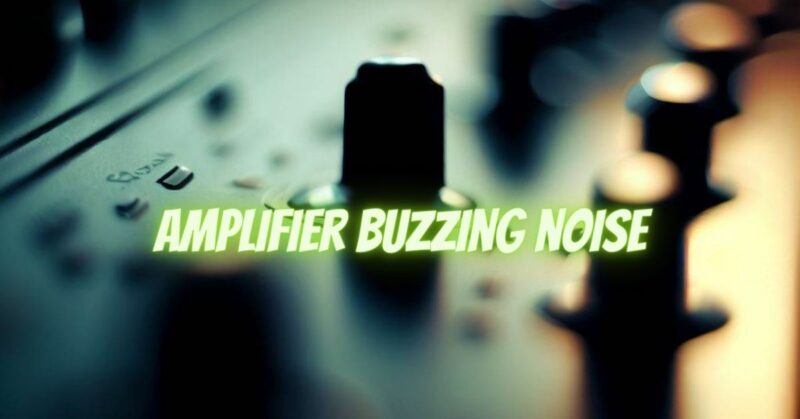Amplifier buzzing noise can be a frustrating issue that affects the sound quality of your audio system. The buzzing noise can stem from various factors, such as grounding issues, faulty cables, electromagnetic interference, or internal amplifier problems. In this article, we will provide a comprehensive troubleshooting guide to help you identify and eliminate buzzing noise from your amplifier.
- Check Grounding Connections:
Proper grounding is essential to minimize buzzing noise in amplifiers. Ensure that your amplifier is correctly grounded by connecting it to a grounded power outlet or power conditioner. Check the grounding connections of both the amplifier and any connected audio devices. Faulty or inadequate grounding can introduce electrical interference, resulting in buzzing noise.
- Inspect and Replace Cables:
Inspect all cables connected to your amplifier, including audio cables, power cables, and speaker cables. Look for any frayed or damaged cables that could be causing interference and generating buzzing noise. Replace any faulty cables with high-quality shielded cables, which help minimize electromagnetic interference.
- Separate Power and Audio Cables:
Keep power cables and audio cables separated to minimize the chances of electromagnetic interference. Ensure that audio cables are not running alongside power cables or in close proximity to transformers, motors, or other electronic devices that can introduce buzzing noise. Maintain a reasonable distance between power and audio cables to reduce the risk of interference.
- Eliminate Ground Loops:
Ground loops can be a common cause of buzzing noise. To eliminate ground loops, use a ground loop isolator or a balanced audio interface. These devices help break the loop and prevent electrical interference that leads to buzzing noise. Install the ground loop isolator between the audio source and the amplifier to effectively mitigate the issue.
- Remove Nearby Electronic Devices:
Electromagnetic interference from nearby electronic devices can contribute to buzzing noise in amplifiers. Move away any electronic devices, such as smartphones, laptops, Wi-Fi routers, or fluorescent lights, that are located in close proximity to the amplifier. These devices can emit electromagnetic waves that interfere with the amplifier’s signal and cause buzzing noise.
- Test with Different Audio Sources:
Try connecting different audio sources to your amplifier to determine if the buzzing noise persists across all sources. This helps identify whether the issue lies with the amplifier or the original audio source. If the buzzing noise is present across multiple audio sources, the problem is likely with the amplifier itself and may require professional attention.
- Consult an Amplifier Technician:
If the buzzing noise persists despite your troubleshooting efforts, it may be necessary to consult an amplifier technician or audio professional. They have the expertise and specialized equipment to diagnose and repair internal amplifier problems that may be causing the buzzing noise. A technician can inspect the amplifier’s circuitry, components, and shielding to identify and resolve the issue.
Conclusion:
By following these troubleshooting steps, you can identify and resolve buzzing noise issues in your amplifier. Checking grounding connections, inspecting and replacing cables, separating power and audio cables, eliminating ground loops, removing nearby electronic devices, testing with different audio sources, and seeking professional assistance when needed will help you eliminate the buzzing noise and enjoy clean, high-quality audio from your amplifier.


